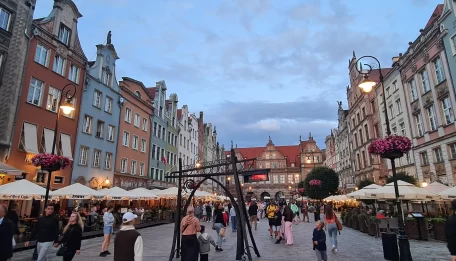SEO Translation and Localization – Polish SEO Translator Tips

You could be missing out on significant revenue if you use the services from translation agencies but don't hire an expert SEO translator. In today's digital world, 73% of internet users are non-English speakers, and over half of Google searches occur in languages other than English. SEO translation and localization are not just about language conversion. They're about making your brand globally accessible and comprehensible. This article shows the crucial role of SEO translation and the expertise of SEO translators in crafting content that resonates across different cultures and search engines.
Traditional Translator vs. SEO Translator
Take a UK company selling bathroom taps, for example. They might use "how to replace a tap" on their webpage to attract customers. But in the US, people say "faucet" instead of "tap." This is where the difference between a traditional translator and an SEO translator becomes clear.
A traditional translator focuses on changing text from one language to another accurately. But with effective SEO translation, it's not just about the direct translation. It's about making sure the right words are used for people searching online in different places. If the translated words don't match what people in another country search for, then the website won't show up as well in search engines like Google.
A human SEO translator knows this. They do more than just translate content. Good SEO translators think about what words or phrases people in different countries use when they search online. They do keyword research for each language and place, ensuring the website uses words that fit local search trends. However, when translating website content, it's not enough to do keyword research and just place it all over the translated text. Unlike traditional translation, SEO translation involves translating with specific SEO software, which I will tell you about later.
So, while a traditional translator is great for getting the language right, an SEO translator is key for making translated content rank in search engines in different countries. They blend translating with understanding SEO terms, marketing translation, and international SEO, which is really important for businesses wanting to reach more people online.
SEO Translation vs. SEO Localization
What's the difference between SEO translation and SEO localization? While similar, they serve different yet complementary roles in international digital marketing.
Specialist SEO Translation
SEO translation is the process where a translation company translates content from one language into another, ensuring that the translated content is optimized for search engines. This service goes beyond basic translation by incorporating keywords relevant to the target market. When a business uses SEO translation services, it means they're not just translating words. They're also adapting their SEO titles and descriptions to resonate with the search habits of the new audience. However, translation alone may not fully capture the cultural nuances or specific market needs.
Benefits of SEO Localization
Localization is the process that takes translation a step further. While SEO translation focuses on accurately converting and optimizing text, SEO localization involves a deeper level of cultural adaptation. This includes not only translation and keyword optimization but also the adaptation of content to reflect local customs, values, and buying behaviors. It's an addition to SEO that ensures the content resonates with local audiences on a cultural level. Localization might involve changing examples, idioms, and images to be more relevant to the local market, in addition to optimizing for local search engine trends.
The Benefits of Multilingual SEO for Your Business
When businesses expand internationally, optimizing their website for multiple languages through SEO translation is a game-changer. Well-implemented SEO localization can transform a business's digital presence. Below are some benefits of SEO for your business:
1. Enhanced Brand Awareness and Global Reach - translating your website into various languages significantly expands its reach and visibility.
2. Boost in Traffic and Return on Investment (ROI) - websites optimized for several languages often outperform monolingual sites in terms of ROI.
3. Increased Leads and Conversion Rates - with broader brand visibility, the potential for lead generation and conversions skyrockets.
4. Reduced Bounce Rates and Longer Visitor Engagement - SEO-translated content encourages longer stays on your site, enhancing overall SEO performance.
5. Cost Savings on Paid Search Campaigns -high-ranking, SEO-translated content is like free advertising on search engine results pages (SERPs).
6. Competitive Advantage - by optimizing your website in various target languages, you gain an edge over competitors who haven't embraced localization.
Ignoring SEO translation and localization is equivalent to missing 80% of search traffic around the globe.
Mastering International SEO for Your Target Markets
Understanding the nuances of SEO elements is critical when optimizing the translation for global markets. Unlike machine translation, which often misses the mark in terms of context and accuracy, professional SEO translation services bring expertise that ensures your website's content is well-translated and optimized for search engines.
A key aspect of this process is adapting the multilingual SEO strategy to the specific market. This might mean altering the original content to include keywords that resonate with the target audience, a task that goes beyond the capabilities of basic translation tools. SEO experts work to optimize the content, ensuring it aligns with the search patterns and preferences of each destination country.
Furthermore, the importance of readability and correctness in the text cannot be understated when translating content from one language to another. While an SEO plugin like Yoast can help gauge how content performs in terms of search engine optimization, it's the human touch that makes the difference. Expert translators create content that is not only SEO friendly but also engaging and accurate, enhancing the overall user experience.
Link building is another crucial aspect. For instance, a website targeting a specific country or language group benefits greatly from links to relevant and authoritative websites within that region. This approach improves the site's domain authority and search engine ranking.
Website localization, an integral part of SEO translation, involves more than just translating the content on your site. It's about adapting all elements - from currency and measurements to visual components - to create a more personalized and relevant user experience for the target audience.
Selecting the right phrases and keywords, crafting proper headlines, SEO titles and meta descriptions requires deep linguistic knowledge and an understanding of SEO tactics. This is where SEO translation services and SEO experts come into play, offering a comprehensive solution that covers both translation and optimization. They ensure that your site's content is not only accurate and culturally relevant but also fine-tuned to perform well in search engines, making them indispensable in the world of international digital marketing.
Check how my website has been performing since I started implementing SEO tactics and optimizing my content:

But remember, SEO is a long-term strategy. It might take a few months to see significant changes in your metrics.
SEO Translation Tips for Polish and Multiple Languages
I have listed 7 key steps below to show our SEO translation process that you can implement not only for Polish, but for many languages:
1. SEO Keyword Research Will You Make Visible in Search Engines
Ideally, you will already have a good understanding of your customers’ search patterns and behaviors. But bear in mind these might vary in different countries; a translated keyword might not have the same meaning as the original keyword. Research search phrases people are using online in a specific geographic region. An efficient and cost-effective keyword research tool is Ubersuggest, where you can search for ideas, related phrases, and questions people ask about your keywords.
Tip: Try to choose keywords that are not too hard to compete with, and that don't have too many people using them, sometimes even just 50-100 people (low volume). This way, when someone looks for these words, they are more likely to find your website. It's like finding the best spot in a game where not many people go, but those who do are exactly the ones you want to meet. This method is really effective for getting the right people to visit your website. What's more, use keywords that have low search difficulty (SD). This is the strategy I've learned from a Polish SEO Specialist, and it works quite well.
A great way to start researching keywords is by using your Google Search Console. In the Performance data section, you can see the keywords people used to find your website. If you write some articles using these keywords, you'll soon notice more people coming to your site. This is a smart trick to get more visitors! See how my metrics changed when I started implementing this SEO strategy:
2. Cultural Context and Quality Website Translation and Localization for Effective SEO
If you want your translated website to perform well, you will need to use culturally contextual keywords and phrases. Make sure your content is relevant and appropriate for the target audience. If the translated keywords and marketing content lack relevance to the people in the destination country, the SEO localization won’t work.
The importance of using precise and grammatically correct translations for SEO cannot be understated either. If the translated wording is of poor quality or lacks the right meaning, your website visitors might click away to a competitor's website. And once they have gone, they might not return, resulting in a missed sales opportunity.
Content localization is much more than exact literal translation. This is the process of adapting content to resonate with the customers you wish to visit your website. Localization focuses on providing an enhanced user experience by reflecting details relevant to the user, for example, language nuances, currency, and measurements.
3. Best Practices for SEO Titles and Meta Descriptions
On-page SEO necessitates the translation of meta descriptions. These brief snippets appear on the search engine listing and encourage people to visit your website. Ensuring that meta descriptions are both engaging and relevant is a key tip for SEO success.
When it comes to SEO, the positioning of keywords within titles is also vital. Placing your keyword at the beginning of a title can improve the effectiveness of SEO optimization. This practice makes your website more accessible and appealing to users, boosting your overall online presence. Tip: Remember that a title shouldn't be longer than 60 characters, while a meta description should be a maximum of 160 characters. And again, if you use a content optimization tool, it will show you exactly what words you should choose to rank for the particular keyword.
4. Article Structure for Search Engine Optimization
Effectively using header tags (H1, H2, H3) on a webpage is very important for SEO. It must be done accurately during the SEO localization process. If you want to rank higher on a search engine listing, you need to include keywords in the header tags. If these headings are poorly translated, they will not make sense to website visitors. Tip: SEO optimization tools like the one below will tell you exactly what words you must use in your translated headings. Remember that your headers must be coherent and appealing. Well-optimized headers enhance readability and engagement, which are key to both SEO success and user experience.
5. Proper Keyword Placement and Its Benefits for Your Business
The strategic placement of keywords in a translated webpage or blog article will increase your online visibility. This process involves using enough keywords and variations throughout the content – not too many or too few. Using too many keywords will impact your SEO in a negative way. A good SEO translator must translate your text while strategically placing keywords, which is a critical factor in the success of SEO efforts.
As I mentioned earlier, there are SEO optimization tools that can help you place your keywords. I use NeuronWriter for SEO optimization. It shows you exactly what and how many words you need to use to rank for the specific keyword. You can see your score at the top and the score of the TOP1 and TOP10 articles in Google. A SEO translator needs to outrank the highest score. It looks like this:

Green keywords show I’ve used them just right, yellow means I’ve used them a bit too much, red clearly suggests I went overboard with these keywords, and grey tells me I haven’t used them at all.
6. Translated Alt Text for Images
Adding keywords to the alt text for images on your website is an important part of the SEO process. Alt text is what will appear on the screen when an image does not download correctly. When Google crawls a webpage, it considers the alt text as part of its indexing process. So, don’t forget to translate the alt text within any images used on web pages and blogs.
By paying attention to these details, you enhance the technical SEO aspects of your site, contributing to better search engine rankings and a more inclusive user experience. Tip: Before uploading your picture, resize it to 1200x1800 pixels, change its format to webp and change its title to your keyword. You can do it in a free tool - Gimp.
7. Links and Anchor Texts
Using links and anchor texts effectively is a key strategy in implementing SEO. Anchor text, the clickable text in a hyperlink, can significantly boost your SEO when used properly. It's about creating links within your webpage that connect to other relevant pages. This not only aids in website navigation but also helps search engines understand the content's context better, improving your site's ranking.
However, translating and optimizing these anchor texts is crucial to maintain their relevance in different languages. While you may have limited control over anchor texts used in backlinks from external sites, ensuring your own are accurately translated and strategically placed can make a big difference in your overall SEO strategy.
Here you can see my article in the Google Search Console after SEO-optimization in Neuron Writer two weeks ago:

Can Machine Translation Implement SEO?
You might know that you can use plugins to translate your website into multiple languages on WordPress. However, keep in mind that this method doesn't optimize your content for SEO, meaning your site is less likely to be found online. Machine translations are literal and lack the human touch essential for translating the website content, making them unsuitable for SEO. These translations often end up being disjointed, nonsensical, and error-prone, impacting content quality and readability, crucial factors in search engine ranking.
Even Google’s Search Advocate advises against using automatic translation tools for multilingual SEO content, as they produce low-quality results that can lead to penalties from search engines. When you use machine translation services that are not human-reviewed and not for sure SEO-friendly, your content falls into the spam category due to poor quality. For effective multilingual SEO, translations must be human-edited, considering cultural nuances and keyword relevance for each target market.
Even AI tools are not as good as a human as Neil Patel claims. He carried out an experiment and found out that "94.12% of the time human written content outranked AI-created content".
SEO Translators for Your Digital Marketing
In today's evolving digital landscape, SEO translation has become a critical component of global digital marketing strategies. It's essential for businesses aiming for international reach, as it goes beyond simple translation, demanding adaptation of content to align with the cultural and linguistic subtleties of different audiences. This approach not only ensures the website is a vital part of a global SEO strategy but also guarantees effective engagement with diverse audiences.
Expert SEO translators play a crucial role in the translation process. They are knowledgeable in SEO tactics and optimize the content while maintaining the original tone and style of the brand. By doing so, they help businesses create multilingual websites that not only communicate effectively in various languages but also adhere to SEO best practices, enhancing online visibility and driving business growth.
*This blog post contains affiliate links. I may earn a small commission to fund my coffee drinking habit if you use these links to make a purchase. You will not be charged extra, and you’ll keep me supplied in caffeine. It’s a win for everyone, really.
summary
To wrap it up, navigating the world of digital marketing is more than just translating words. As your business steps into new territories, remember that the right translation service is your key to success. So let the magic of expert SEO translation guide you to make every word count where it truly matters.
Want To Expand into the Polish Market?
Langbay specializes in SEO-friendly English-to-Polish translation and localization, tailoring your website to appeal to Polish customers. Our goal is to enhance your business in Poland with compelling and accurately translated content that’s optimized for the local market.

Blog
Knowledge Base
Exclusive Bonus Just for You
Get Your Free eBook







